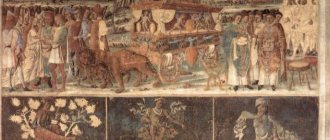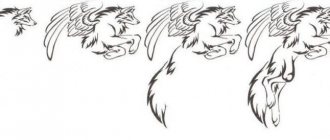Man is a wolf to man (homo homini onstrum) - the theory, rather insulting to wolves, because, realizing their power and impunity, rejecting the moral and written rules of social life, setting at the head of the right of the strongman and the law of the jungle, people in the struggle for existence turn into such monsters, in comparison with which the animals - the lambs of God.
"A small group of citizens stand on the Fontanka River bank, looking out at the bridge crowded with the black crowd, and say calmly, indifferently: 'They have drowned the thieves. - Have they caught many? - Three, they say. - One, a young man, was beaten to death. - To death? - How could he be? - They must be beaten to death, or there will be no life for them... An imposing, grey-haired man, red-faced and somewhat resembling a butcher, confidently says: - There is no trial now, so we must judge ourselves... Some sharp-eyed, worn-out little man asks: - Isn't it very simple, - if we judge ourselves? The grey-haired man answers, lazily, without looking at him: "Simple is better. Hurry up, the main thing. - Chu, howling!" The crowd is silent, listening. From afar, from the river, came a wild, wistful cry. (Novaya Zhizn newspaper #207 January 3, 1918)
——
"Then the Jews were forced to undress and were led through passages in the embankment to the edge of the ravine, on the opposite side of which a machine-gunner sat on a specially equipped wooden platform. Under the ruthless dagger fire of the machine gun, the zealous policemen of Kiev drove with sticks, lashes, and feet the confused, naked, completely distraught people, without letting them regain their senses or get their bearings. Heart-rending sobs, cries of the policemen: "Hurry, hurry!", pleas for help, curses to the executioners, prayers drowned out by the merry melodies of waltzes coming from loudspeakers, the roar of the engine of an airplane circling over the pit..." (M. V. Koval, "The Tragedy of Babi Yar...")
——
"The railroad companies also used live targets to entertain passengers. When the train came within shotgun range of the herd, it would slow down or stop, the windows would be lowered, and passengers would be invited to engage in sport using the weapons and ammunition provided by the company. Men and women did not miss an opportunity to have fun. The carcasses of the animals were usually left on the plain, except occasionally some train attendant would cut off a few tongues that were prepared for the ladies and gentlemen at another meal in recognition of their dexterity... The bloody slaughter unleashed by hide hunters and also by the simple "sportsmen" who began to make their way west took the lives of 3 million 158 thousand animals! In 1887, English naturalist William Grieb, who drove across the prairies, wrote: "Bison trails were seen everywhere, but there were no living bison. Only the skulls and bones of these noble animals whitened in the sun" ("The End of the Buffalo Trail." "Around the World," #7 1988).
[edit] Modifications.
- Victor Hugo used the variant homo homini monstrum (man to man monster).
- In the program of the Communist Party of the Soviet Union put forward at the XXII Party Congress in 1961, the slogan "man to man is a friend, comrade and brother" was put forward to become the basic communist morality. The slogan was used to create a counterweight to the capitalist countries, in which, according to the propagated opinion in the USSR, the principle of "man to man is a wolf.
- A joking modification of the phrase "man to man is a wolf, but a zombie is a zombie" was created on the Internet[1].
What Latin phrases do you need to know to pass for smart
Do you think that Latin has been dead for centuries? Wrong!
Sign up and read the Express Gazette at:
Despite the fact that the Latin language is considered dead, it comes to life if someone decides to insert into his speech one of the aphorisms written or spoken by representatives of the ancient civilization. EG.RU offers to remember winged expressions in Latin, which will help you to shut up any wise interlocutor in a concise and beautiful way.
Homo homini lupus est.
Homo homini lupus est - man is a wolf to man.
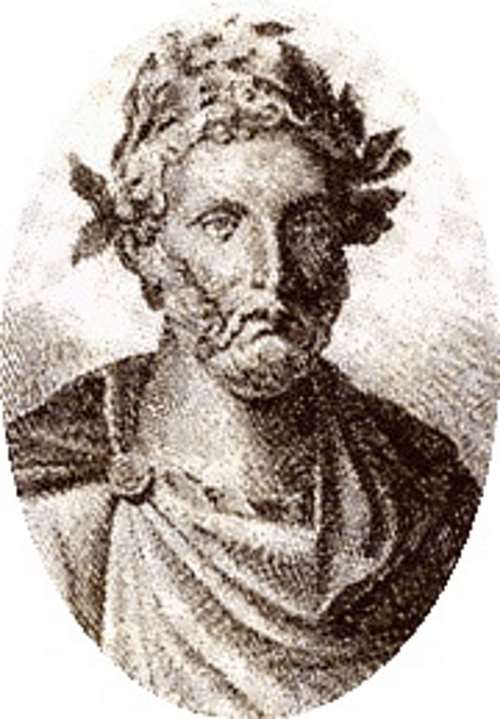
Photo: wikipedia.org
This quote from Plautus "Donkeys" translates as "man to man is a wolf." It is often used to draw attention to our disconnectedness and inherently negative attitudes toward one another.
The ancient Roman "humorist" Plautus put this phrase into the mouth of one of the characters in his comedy, thus demonstrating that problems associated with a lack of nobility and trust existed even two thousand years ago.
In pace leones, in proelio cervi
In pace leones, in proelio cervi - in times of peace lions, in battles deer


Photo: wikipedia.org/Serge Lachinov
And again about human vices. This time about cowardice, incompetence and betrayal of ideals. "In time of peace - lions, in battle - deer" - that's how this quote from the work of Tertullian "On the Crown of the Warrior."
By the way, the early Christian writer Quintus Tertullian was a very educated man and wrote not only in Latin, but also in Greek. Unfortunately, his works in Greek have not survived.
Decipimur specie recti
Decipimur specie recti - we are deceived by the appearance of being right
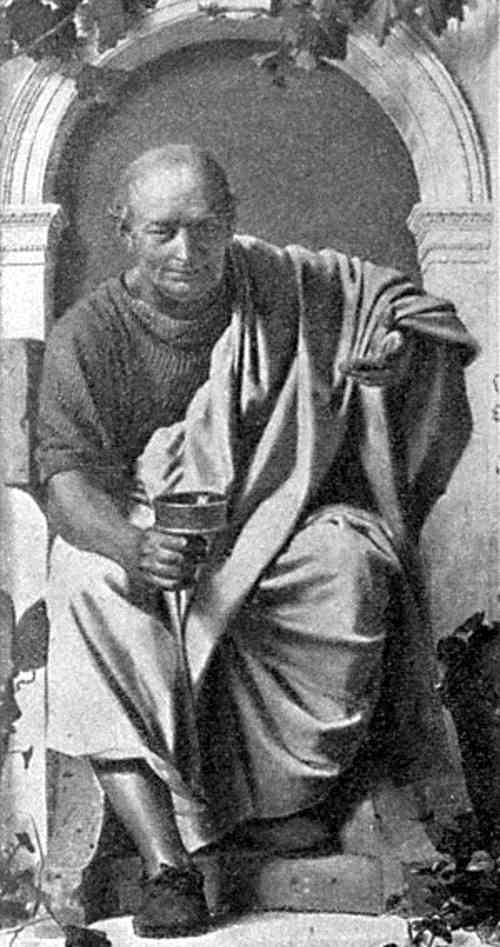

Photo: wikipedia.org/Anton von Werner/Gabor
Ancient Roman poet Horace wrote in his most voluminous work, The Science of Poetry, about many things that can be useful not only to poets but also to ordinary people.
"We are deceived by the appearance of being right" is how this phrase is usually translated. It begins with a very interesting discussion of the poet, who confesses that his attempt at originality ended in some written nonsense and that his desire for fame led to bouts of arrogance. Indeed, not everything that seems absolutely right can lead to anything good.
Amor non est medicabilis herbis
Amor non est medicabilis herbis - love cannot be cured with herbs


Photo: wikipedia.org/Auréola
"Love with herbs has no cure" once wrote Ovid in his poetic cycle The Heroids, which consists of fictional messages from mythical and historical characters to one another.
Young Alexander Sergeyevich Pushkin picked up on this idea of Ovid and in the Lyceum hospital wrote with chalk on the wall above the bunk Ivan Ivanovich Pushchin... such a poem:
Here lies the sick student; His fate is inexorable. Bring away the medicine: The disease of love is incurable!
Aditum nocendi perfido praestat fides
Aditum nochendi perfido praestat fides - trusting the treacherous enables him to harm


Photo: wikipedia.org/Jean-Pol GRANDMONT
This phrase is by the philosopher and poet Seneca. It can be translated as "trust in the treacherous enables him to do harm.
In general, of course, one cannot live without trust. People who treat others with suspicion make a very unfriendly and sometimes unpleasant impression. Cautiousness is another matter. But to argue with the truthfulness of the quotation from the tragedy of Lucius Seneca is simply foolish. The treacherous, trusted ones can really make a mess of things. And there are many such examples in the history of mankind.
Benefacta male locata malefacta arbitror
Benefacta male locata malefacta arbitror - I consider the beneficence done to the undeserving as atrocities
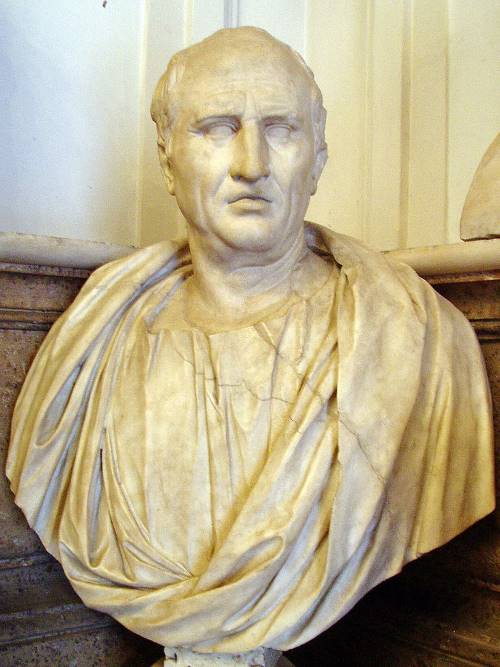

Photo: wikipedia.org/Glauco92
Once upon a time the great orator Cicero said: "I consider favors done to the undeserving as wickedness."
Cicero, of course, was a clever man, but this thought of his evokes a strange feeling - who decides who is worthy and who is not? Cicero died a long time ago. I am reminded of a quote from a great Armenian cartoon, "Wow, a talking fish!": "Do good and throw it in the water. Is it worth waiting for something in return or wondering who is in front of you if the person needs help?
Quia nominor leo.
Quia nominor leo - for I am called a lion
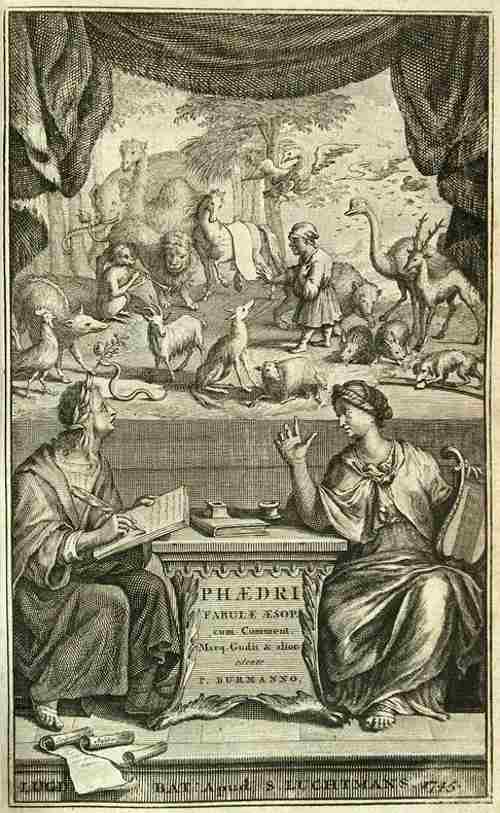

Photo: wikipedia.org
Ancient Roman fable writer Phaedrus Ancient Roman fabulist Phaedrus once wrote a story about how a lion divided his prey with his friend Donkey after the hunt: he divided it into three parts and took all three for himself. The first part was due to him as a king of beasts, the second as a hunter, and he took the third part with the words: "For I am called a lion.
Unfortunately, fangs and claws have always been the most weighty arguments in disputes...
Ivanov Andrey
Interesting history of culture
[edit] Sources
- https://bash.org.ru/quote/408418
| Navigation by topic | |
| Phrases 1 | |
| Where's the tsar? You have to have a snack! - And the compote? - Have they let you out of the asylum yet? - Your place is by the crapper - Bring in the Ambassador's citizen! - Come back, I'll forgive you everything - A thief must sit in jail - All that he's gained by hard work - While our spaceships are sailing across the universe - Giant of thought, father of Russian democracy - Go away, Vasya - You're a witch! - Yes, I am! - I'm waiting... - Demons have locked me up... - What a disgusting thing this gulf fish of yours is! - What Boris the Tsar!? - Kemska volost - In short, Sklifosovsky! - A little lie breeds a lot of mistrust. - I'm haunted by doubts. - You must, Fedya, you must. - Our people don't take cabs to the bakery. - Don't put me to death, Your Majesty, you must speak out! - It's not my fault - Don't make a noise, I'm an invalid - Give me the whole list - Leave me alone, old woman, I'm in sorrow! - Pleased to meet you, Tsar - Put the phone down! - I'm sorry about the bird! - Rousseau turisto oblico morale - Wrap it up, I've got a job to do - Shift your eyebrows! - Semyon Semyonych! - Please tell me, don't you have a separate office? - A violinist is not needed - Calm down, only calm down - Student, Komsomol member, athlete - Everyone dances! - What are you trying to say, tsar's face?! - Money in the morning, chairs in the evening! - Keep your money in the savings bank - Whose shoe? Mine! - Stirlitz is walking down the corridor - Stirlitz, I'll ask you to stay - I'm the one who got in - I'm not a coward, but I'm afraid - I demand to continue the banquet! - ♪ I'm a man exhausted by the narcan ♪ | |
| Phrases from Western cinema and world literature | I'll be back - There can be only one - And the king is naked! - Bolivar can't hold two - Worse times have passed, but no meaner - The Volga runs into the Caspian Sea - What Russian doesn't love a fast ride - No spoon - Your back is all white - I love the smell of napalm in the morning |
| Political phrases and phrases from the Bible | And here's a read! - The abyss cries out to the abyss - No buldyrabyz! - Boris, you're wrong - In the grave to Gaidar, in jail to Khodorkovsky, or in exile to Berezovsky - Tops can't, bottoms won't - Those who take the sword will perish by the sword - It's all Chubais' fault - There's no more time - You don't understand, It's different - No money, but you hold on - Catch up and overtake - No one brought Donbass to its knees - Live Belarus - Sentinel is tired - Assholes who prevent us from living - Treason, cowardice and deceit everywhere - Who doesn't jump, is... - I love you too - Much knowledge, much sorrow - God in heaven, Russia on earth - Wrong seat - Obama's a schmuck - They traded a bully for Luis Corvalan - There you go again - Party and Lenin are twin brothers - It never happened under Stalin - Handle back - Sabbath for man, not man for Sabbath - Will you shut up, man? - You Have Two Cows - Wanted the Best, Got the Best - What Is This - Stupidity or Treason? - Language is a dialect that has an army and a navy |
| Other phrases | Let's get ready to rumble! - SATOR AREPO TENET - Vae victis - Bring back the Jews! - Eternity smells like oil - Hannibal at the gate - Genius and villainy are two things incompatible - Bitter! - Give me two! - The day teaches the day - The die is cast - Don't swim too far - The law is a stick - Close your eyes and think of England! - Two turkeys won't make an eagle - God save me from friends, but I can handle my enemies - Caesar or nothing - How I spent my summer - Like king, like crowd - Carthage must be destroyed - Roll a sausage down the Spasskaya Street - China - A sleeping giant - He who comes late, dice it - Everywhere you turn, the wedge - I only care about mice - No room - On the terrace near the hedgerow... - Don't believe, don't fear, don't ask - Don't believe - Don't ask, don't tell - Haven't read, but I judge! - Ignorance is imputed - God works in mysterious ways - You can't be a little pregnant - O times! O manners! - Powder! Go away! - Because gladiolus - A criminal has no nationality - Flying like a plywood over Paris - Divide and rule - Russia is the home of elephants - Roulez - Russians don't give up - Happy New Year, Happy New Year! - Sex is no excuse for dating - Sitting down without eating - Socrates is my friend, but truth is dearer - No third party - What Jupiter can do, the bull can't do # Man to man # - ♪ I don't know about this ♪ ♪ I'm fucked up, dear editor ♪ |
The proverb "man is a wolf to man" is disproved and no longer works
ViolettaPisits 03.03.2019 at 08:46
Then there were quite a few skeptics who were convinced that the free-rat was driven by a desire for companionship with a mate, and not at all by an understanding that another animal was in trouble.
I, too, will take the side of the skeptics, but I will express my own opinion on this matter. It is impossible to argue with the results of research, but it is quite possible to disagree with the conclusions.
The behavioral peculiarities of the rat (the pasuke, gray rat), not the white laboratory rat, but the normal rat, which was subjected to selection only by natural factors and displaced the black rat, were formed for centuries and have quite definite tasks. All the behavioral features of these ancient animals are directed by nature towards one goal - the survival of the population and the species as a whole.
"The behavior of gray rats was mainly studied when they were kept in captivity. Very interesting are the observations of Calhoun (Calhoun, 1963), who kept gray rats in the countryside and saw how separate groups of animals stand out as their numbers increased. Our compatriots have conducted many studies in aviaries and cages (Sokolov, Khorlina et al., 1977). However, the behavior of rats in natural conditionssignificantly differs
from the aforementioned."
Rats lead mainly a social way of life, and their behavioral characteristics depend largely on the population size. Research confirms this.
"At high densities, rats exhibit a minimum of caution. We have had the opportunity to observe this in a variety of situations..."
"...We have written before (Karaseva, 2000), what an extraordinary wariness rats show to the laid out bait, even without inclusion of poison in it. Our numerous experiments have shown that rats are most cautious on those pig farms where deratization has been carried out recently. This is explained by the fact that the number of rats is small and, moreover, mostly those individuals who have not taken and do not take poisoned bait are preserved. This residual part of the population makes it particularly difficult to carry out a deratization (Chitty, 1954)."
All of the above can explain the rat's lesser interest in the treat, in relation to the task of helping a congener. And this is by no means, in my opinion, a manifestation of empathy attributed to rats, but rather an instinctive behavior that allows rats to perform the task of population conservation. The rat understands at the level of instinct that any tasks are easier to perform with the help of congeners. Other scientific data should also be taken into account:
"Rats swim well (can stay in water for up to 72 hours) and dive, staying in the water column for a long time and even catching prey there."
Also about
Mutual aid between individuals of rats is related to their social way of life.
Rats live mostly in groups and, in nature, in colonies. There may be several hundred individuals in a colony; in Buddhist temples, where they are constantly fed, as many as 2,000. There are complex hierarchical relationships within the group.
So rat empathy can only appear in a person's head and by his own and voluntary delusion, no support for the assertion is or can be realistically provided. In any case, the "evidence" with which we are indoctrinated is highly unconvincing. Although, it is worth confessing that one simply wants to believe it.
Titus Maccius Plautus (c. 254-184 BC) and his comedy Donkeys
Roman poet, playwright. There is very little information about his life. Judging by the surviving few of his works, he was well acquainted with the world of the Roman theater, its backstage, manners, the audience. He wrote about one hundred and thirty comedies, of which twenty have survived. Plautus is considered a forerunner of Aristophanes and Shakespeare. The plots of Plautus' comedies are taken from life in ancient Greece, but with so many local details, folk Italian puns, ambiguities, and jokes of every sort, that there was hardly any Greek left. The comedy "Donkeys," consisting of a prologue, five acts, and fourteen scenes, belongs to the period of Plautus' late work:
"The old father, who lived under the power of his wife, To his son in love wanted to get some money. Liban and Leonidas, sagacious slaves, Savvy managed to get twenty mines, Tricking the merchant that came to pay for donkeys. And the money was taken to his girlfriend by his son and father. Suddenly a rival showed up and gave them away."




